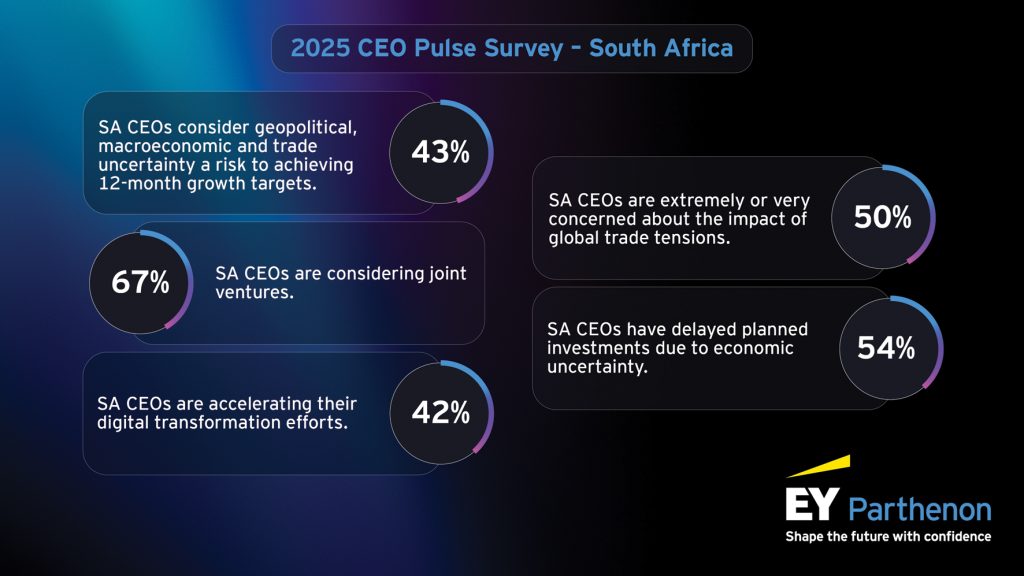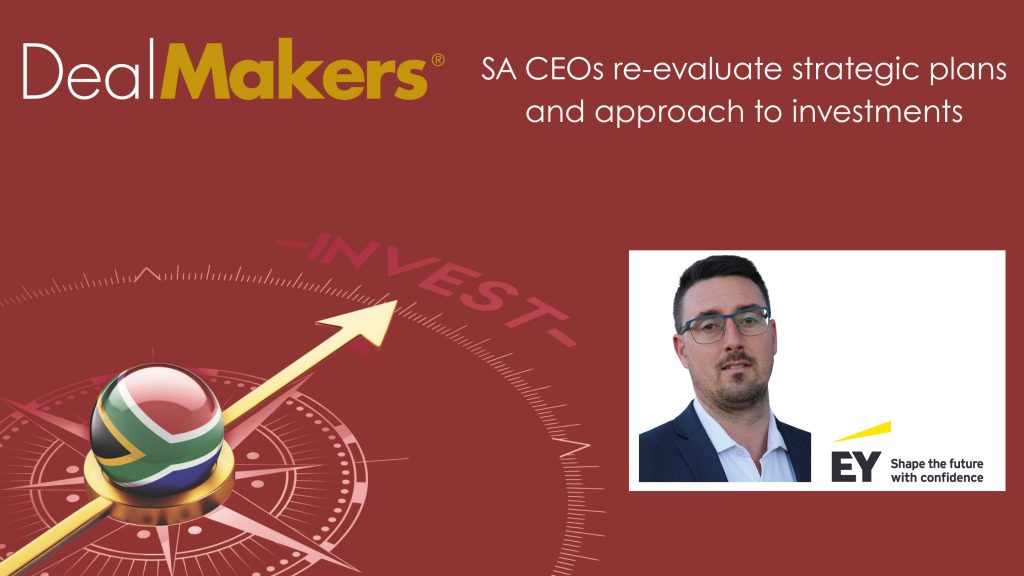According to our latest EY Parthenon CEO Outlook Pulse Survey, South African CEOs navigating the complexities of today’s global landscape recognise that geopolitical tensions, macroeconomic fluctuations and trade uncertainties pose both significant risks and opportunities for their investment and growth strategies.

Unsurprisingly, the recent spate of tariff increases has become a pressing concern, compelling CEOs to re-evaluate their tactical plans and approach to deploying capital. In response, some are temporarily delaying planned investments, reflecting a commitment to safeguarding operations and ensuring long-term sustainability in an unpredictable environment.
Despite these challenges, South African CEOs are demonstrating resilience and adaptability:
• While 43% identify geopolitical, macroeconomic and trade uncertainty as a risk to achieving their 12-month growth targets – mirroring the global average – local leaders are taking more proactive steps.
• For example, 67% are considering joint ventures, in line with global peers, but 42% are accelerating digital transformation, compared to just 24% prioritising technology globally.
• Additionally, 54% have delayed planned investments due to economic uncertainty, yet SA CEOs remain notably committed to maintaining transactional activity over the next year.
• To mitigate the impact of rising tariffs and broader uncertainty, we see businesses actively investing to diversify their supply chains and end markets. This strategic pivot is essential for enhancing resilience. In the South African context, CEOs continue to show clear determination to continue investing in enterprise transformation and pursuing growth opportunities. This forward-looking stance signals confidence in the market’s potential, and a readiness to navigate complexity with agility and purpose.
A Global view
According to the latest EY Parthenon CEO Outlook Survey, 98% of Global CEO respondents are concerned about tariff increases affecting their company’s operations and sales in the next 12 months, with 50% very or extremely concerned. Indeed, geopolitical, macroeconomic and trade uncertainty is cited as the top risk to achieving growth (42%), and 54% say they have delayed a planned investment as a result. But CEOs are responding proactively by rethinking global relationships: 44% of respondents say they are looking to adjust supply chain arrangements; 42% are exploring product design innovations to reduce reliance on tariffed materials; and 39% are relocating operational assets to a different geography.
The complexity of the current landscape is reflected in the fact that the most critical trading relationships are not always the closest or most locally significant, according to the survey. While 42% of Chinese respondents cite the US-China tariff and trade dispute as their primary concern, 8% are more focused on the US-Mexico relationship. This underscores global interconnections and the difficulty of navigating tariff challenges, particularly as other major economies react to potential US tariffs. This contrasts with a highly positive outlook for M&A in 2025 prior to the US administration’s tariffs announcement of 2 April this year, which culminated in US$1T of deals recorded during Q1 2025 – up 25% year-on-year. With 57% of survey respondents hoping to pursue M&A in the next 12 months, the report indicates that pre-existing pressures – tech adoption and a talent squeeze key among them – will remain pent-up transformation drivers that will see CEOs return to dealmaking as the market settles.
M&A can drive transformation and deliver value in times of challenge
While reports of integration hurdles, cultural misalignment and overestimated synergies often lead to speculation around how much shareholder value is delivered post-deal, the survey tells a different story about the CEO experience. More than half of CEO respondents (55%) say their recent acquisitions met or exceeded value expectations, with only 2% reporting value destruction.
AI investment roadmap unclear as many CEOs look to cost reduction
Global CEOs report mixed results from artificial intelligence (AI) deployments to date, which may slow down implementation in a turbulent year.
While 36% of respondents say they plan to expand AI investments after positive results to date, 25% say they are “scaling back or reconsidering” AI investments due to “unclear or disappointing” returns. This may create pressure on AI deployments, as CEOs try to balance a cautious response to the current volatility with an ongoing demand to accelerate AI adoption, and to upskill and hire talent for specialised AI roles.
With nearly half of CEO respondents (42%) indicating that they are looking to absorb additional costs internally through operational efficiencies and cost reductions, many may be delaying tech investment pending more geopolitical certainty.
Also fuelling a renewed and likely growing focus on cost management is the challenge of inflation. Seventy-one percent of respondents agree that inflation continues to be a challenge and will be an issue they need to navigate for the next year, and many of those will be looking at opportunities to mitigate cost increases.
In summary
South African CEOs are proactively adapting to global challenges, with 43% citing geopolitical and economic uncertainty as a risk, on par with global peers. However, they are more likely to accelerate digital transformation (42% vs 24% globally) and pursue joint ventures (67%).
Despite 54% delaying investments, SA leaders remain committed to dealmaking and enterprise transformation. This mirrors global trends, where CEOs are rethinking supply chains and planning M&A activity despite tariff pressures and inflation concerns. While AI investment is mixed, both local and global CEOs are focused on cost efficiency and long-term value creation.
Quintin Hobbs is an EY-Parthenon Africa Strategy and Transactions Leader | EY

This article first appeared in DealMakers, SA’s quarterly M&A publication.
DealMakers is SA’s M&A publication.
www.dealmakerssouthafrica.com



